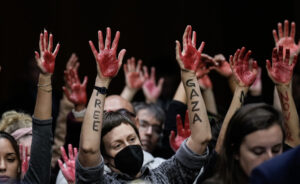It’s almost like a religious ritual. Every Saturday since 7 October, central London has swollen with protestors waving the Palestinian flag and chanting “From the River to the Sea”. For the impartial and curious observer, two facts are immediately striking. The first is not all that mysterious: the protestors are disproportionately Muslim. The second is more of an enigma: why are they so young?
For years, young people have tended to be much more pro-Palestine and anti-Israel than their elders. According to a poll conducted a few months before Hamas’s attack, American millennials are the first generation in history to sympathise with the Palestinians more than the Israelis. In Britain, 18- to 34-year-olds are also far more supportive of the Palestinians (23%) than the Israelis (only 7%) — almost the precise inverse of the 55- to 75-year-olds. This being so, at universities across the country, you will find students and academics calling for an Intifada and tearing down posters of the kidnapped Israelis.
The noisiest activists most attract our attention. But the whirlpool also sucks in those rubberneckers who just want to know what mantra they have to intone today. Silence, being “violence”, is never an option: on all sorts of issues, you need to have a view. Here, “intersectionality” provides a solution: instead of going through the laborious effort of selecting your stance on each issue à la carte, you can opt instead for the set menu: climate justice is racial justice is LGBTQ justice is reproductive justice is Palestinian justice. But “intersectionality” breeds conformity. If you dissent on any one of these issues, you risk suggesting to your peers that you dissent on the others — marking you out as a bad person.
And not just bad, but gullible, too. Supporting Israel, or simply having a more nuanced position than “From the River to the Sea”, is proof that you’re a brainwashed rube. TikTok is awash with videos promising to tell you what the conflict really means, and what’s being kept from your eyes by the powers that be. “‘Israel’ isn’t a country,” one of the more infamous infographics patronisingly explains. (Note the scare quotes.) “They are a settler colony.”
Since 7 October we have seen the invention and dissemination of these conspiracy theories in real time, and young people have disproportionately gobbled them up. A full 17% of Americans — already troublingly high in the face of all the evidence — think the official narrative about the attacks is a “false story”; among the 18-24 cohort, that number nearly doubles. One of Gen Z’s defining traits is a profound scepticism of established authorities who propagate “official narratives”. And Israel — partly because it is an American ally, and doubtless also because it’s Jewish — gets the full blast of this cynicism. As Dave Rich wrote in Everyday Hate, “the difference between racism and antisemitism is the difference between a prejudice and a conspiracy theory: and while prejudice is out of fashion for today’s youth, conspiracy theories are all the rage”.
Given that young people skew Left, the question of why they are so anti-Israel (sometimes to the point of being pro-Hamas) is partially a question of why the Left is so anti-Israel. And, as Noah Smith has argued, the Left’s strong attachment to Palestine is a consequence of the triumph of liberalism. With communism gone, and the old European empires dismantled, the Palestinian cause, with all its revolutionary and “anticolonial” accoutrements, offered a way out of “end-of-history ennui”. But this generic lust for activism is turbocharged among the young, for whom Israel has taken on the associations South Africa held for the Eighties generation. Here, Gen Z believes, is another apartheid regime to boycott and sanction, with its own oppressed ethnic minorities onto which contemporary concerns about race can be mapped.
Curiously, however, Israel is a much more diverse and multicultural country now than it has ever been, including when it was Romanticised by an earlier generation of socialist activists. The ubiquitous claim that Israel is a “settler colony”, often deployed to justify violence against Israeli civilians, fails to acknowledge that the majority of today’s Israeli Jews are of Middle Eastern and North African extraction, expelled from those lands against their will. If Israel is an “apartheid” state in any sense of the term, this is not along obvious racial lines: many Israeli Jews are indistinguishable from Palestinian Arabs. Calling Israel a “settler colony” also begs the question: a colony of whom? But none of this stops activists from countries where most Jews are categorised as “white” — and where Arabs are “non-white” — from imposing onto Israel those familiar racial and “decolonisation” dynamics. The Palestinian cause, in other words, is already packaged for Gen Z in a familiar language.
Zionism has always been about two key claims: first, that the Jews need a state of their own, and second, that this state should be in Palestine. After the Holocaust, many Jews and non-Jews alike were more than convinced by the first claim. The earlier converts to Zionism, who migrated in the thousands to Ottoman or British Palestine, were vindicated in their decisions; those who remained in Europe, no matter how they assimilated, were not. But the Holocaust is receding from memory: one of its survivors was among the slain on 7 October, and there aren’t many others left. And, in a symbolic nominal and chronological exchange, Nakba seems to be taking on some of the moral weight that the Holocaust once had, Israeli history starting in 1948 rather than 1945.
Like much of the new wave of anti-imperialist popular history, this offers the kind of subversive counter-narrative that many in Gen Z crave — resentful, perhaps, of hearing so much about the Holocaust. The Nakba becomes the other genocide, the one “they didn’t teach you about at school”. (It is perhaps striking that there is, to my knowledge, no agreed-upon name for the Jewish exodus from the Islamic world which it is contemporaneous with.) Pro-Palestine scholars such as Ilan Pappé deliberately craft parallels between the Nakba and the Holocaust: Pappé’s The Ethnic Cleansing of Palestine (2008), a staple of activist reading lists, mistranslates part of David Ben-Gurion’s diary to give the false impression that the Jews in 1948 were preparing to gas the Arabs. There must be, in the eyes of those who view this substitution as total, something irresistibly compelling — something almost fable-like — about the idea of Jews becoming Nazis.
Gen Z, of course, are not the first generation to feel broadly hostile towards Israel. But what’s striking is the intensity of their hostility — something which can only be understood as part of the broader story of how political activism works post-2020, and how the Holocaust’s near monopoly on our understanding of evil has been challenged. Before, Israel could effectively sell a narrative that was highly appealing to young idealists — one of a downtrodden people who, emerging from the gas chambers, dared to assert their place in the world.
But as Israel’s power has grown, as it has shifted Rightwards, as the plight of the Palestinians has become more desperate, and as we move further in time from the Holocaust, that lustre has worn off. On the fundamental question of Israel’s right to exist, Israel is losing the battle for young hearts and minds. Instead, with their own claims to anticolonial resistance and racial victimhood, it’s the Palestinians, now, who are telling the better story.
Disclaimer
Some of the posts we share are controversial and we do not necessarily agree with them in the whole extend. Sometimes we agree with the content or part of it but we do not agree with the narration or language. Nevertheless we find them somehow interesting, valuable and/or informative or we share them, because we strongly believe in freedom of speech, free press and journalism. We strongly encourage you to have a critical approach to all the content, do your own research and analysis to build your own opinion.
We would be glad to have your feedback.
Source: UnHerd Read the original article here: https://unherd.com/



